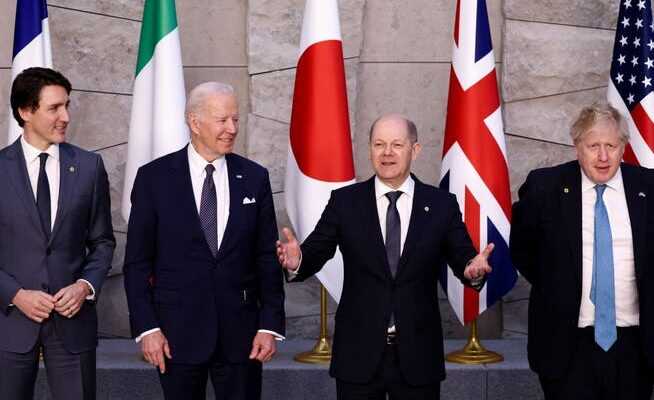The German government plans to invest an additional 100 billion euros in defense over the next few years. Now a first major armaments project is emerging, for which part of the money could be used.
Canada’s Prime Minister Justin Trudeau, US President Joe Biden, German Chancellor Olaf Scholz and British Prime Minister Boris Johnson pose at the NATO summit in Brussels March 24.
(dpa)
Chancellor Olaf Scholz is considering setting up a missile defense shield for the whole of Germany based on the Israeli model. “That’s definitely one of the things we discuss, for good reason,” said the SPD politician on Sunday in the ARD program “Anne Will” when asked whether there was a protective shield against rocket attacks like in Israel across the country shall be.
To justify the possible billion-euro project, he said with a view to Russia: “We all have to prepare for the fact that we have a neighbor who is currently willing to use violence to assert his interests. That’s why we have to make ourselves so strong together that this doesn’t happen.”
Scholz did not want to comment on the details yet. “I have decided not to divulge the details of a plan that has not yet been finally discussed here.”
«Arrow 3» can destroy long-range missiles in the stratosphere
The “Bild am Sonntag” had previously reported on the plan. After that, the purchase of the Israeli system “Arrow 3” is being considered. It is capable of destroying long-range missiles very high above the Earth, well into the stratosphere, the second of five layers of Earth’s atmosphere. The Bundeswehr has not yet been able to do this.
According to “BamS”, the costs would be two billion euros. The system would be operational by 2025. After the start of the Ukraine war, Scholz announced a 100 billion euro program to upgrade the German armed forces. On Wednesday he discussed this with Defense Minister Christine Lambrecht and Inspector General Eberhard Zorn.
No tax increases to finance the consequences of the war
Scholz rejected tax increases to finance the consequences of the war and reaffirmed the validity of the debt brake. He referred to the agreements of the traffic light parties in their coalition agreement. «We have found an understanding in the coalition between the three parties on the issues of both the debt brake and the issue of tax increases. And all three will stick to them in the end.”
“Dramatic measures” in the event of chemical weapons use
Scholz threatened Russian President Vladimir Putin with “dramatic measures” if chemical weapons were used. “The use of biological and chemical weapons must not take place, and that’s why we are all so explicit, so explicit on this issue,” he said. There are already considerations about such measures, said Scholz, but did not become more specific.
However, he made it clear that even if Russia used chemical or biological weapons, NATO would not enter the war over Ukraine. “NATO will not become a party to the war, that’s clear.”
Change of power in Russia “not the goal of NATO”
Scholz also made it clear that NATO is not seeking a change of power in Russia: “That is not the goal of NATO, nor of the American President, by the way.” The Chancellor was reacting to a statement by US President Joe Biden, who on Saturday openly questioned the rule of Russian President Vladimir Putin because of the Ukraine war. “For God’s sake, this man can’t stay in power,” Biden said.
Scholz pointed out that he had discussed this question with Biden during his inaugural visit to the White House – even before the Ukraine war. “We both fully agree that regime change is not an object or goal of the policies we pursue together.” It is the “matter of the peoples and nations themselves” to fight for their freedom.
German gas billions: Russia can “do nothing” with it
Scholz rejected the criticism that Germany was helping to finance the Ukraine war with its energy imports from Russia. “Russia currently cannot do anything with the money it has in its accounts because of our sanctions,” he said. It’s about a few hundred billion in foreign exchange reserves. “It is therefore very unlikely that this connection even exists.”
According to estimates, Germany transfers a three-digit million amount for energy supplies to Russia every day – albeit usually in euros or dollars.
